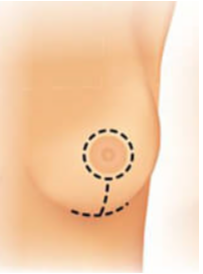Breast Reduction
For whom is breast reduction done?
- Many women have large breasts due to hereditary, weight gain and hormonal changes. They find it uncomfortable as their large breasts attract unwanted attention from people making them self-conscious both in their workplace and while participating in leisure activities such as shopping and going to the gym. The large breasts may also produce shoulder pain, neck pain and back pain making them uncomfortable. The undue weight of the breasts may produce deep furrows over the shoulder. Excessive sweating under the breasts may result in irritation of the skin and fungal infections. Getting into normal clothes for many is not possible, and they may need to buy costlier and special clothing. These reasons may dent the confidence of the patient as well as prevent them from pursuing many activities.
What is breast reduction?
- Breast reduction is a surgical procedure in which the excess breast tissue is removed from the breast to give back a good size and shape.
What is done when I consult the doctor?
- We would like to meet you before the surgery to talk to you in detail about what exactly you want, how we can fulfil your expectations, what the surgery would entail, the postoperative recovery, the risks and complications associated with this procedure. We would also ask some questions regarding your general health to ascertain that you are fit enough to undergo the procedure. We believe in being very transparent, and we also do not pressurise anyone in going through the procedure as we feel that the decision to undergo the procedure should only be the patient’s decision. We are only there to help you make the decision and help you achieve your expectations. We may take photographs so that we can compare the result before and after surgery. We may take few blood tests and any other test that would be necessary for fitness during surgery.
Where would the incision be made during the operation and will there be a scar after the surgery?

- The final scar will be around the areola of the breast which will not be noticed. It will continue perpendicularly down from the areola of the breast to the inframammary fold where there will be another scar below the breast. This is the best place to have a scar, and we will take all measures to produce a good scar.
What is done during the operation?
- The breast reduction operation is done under general anaesthesia. The nipple, areola and part of the breast tissue are conserved. The rest of the breast tissue are excised to reduce the size of the breast and the breast is then closed. There will be a drain tube coming out through the chest to remove any excess blood or serous fluid.
Facts at a glance about the operation and postoperative instructions:- ( May change person to person as each person is different. Please confirm with the doctor)
| Type of Anaesthesia | General Anaesthesia |
|---|---|
| Surgery Time | 3 hours |
| Hospital Stay | 2 - 3 days |
| Sleeping position | On back for 2 weeks |
| Walking to toilet | The next day |
| Mobilising within house | From the second day |
| Taking a shower | The next day |
| Driving | 2 weeks |
| Sports and Exercise including gym | 6 weeks |
| Time off work | 2 weeks |
| Full recovery | 6 - 8 weeks |
| Special Bra | 2 weeks |
How is the post-operative period managed?
- Patients may feel mild discomfort with the operation which will be adequately controlled by painkillers. The patient will be mobilised the next day. If they feel comfortable, they can walk to the toilet and may take a shower. The amount of fluid and blood collection in the drain is noted everyday. When the amount of drain output is less, we will then remove the drain which is usually painless. For a few days after the operation, the breasts may look swollen due to oedema which will settle down in a few weeks. After the patient can comfortably walk to the toilet and after the drain is removed the patient is discharged.
Will this surgery interfere with lactation or sensation over the breast?
- As a part of the breast is removed, there is a considerable amount of milk ducts that are removed along with a part of the nerve supply to the nipple. However, in most of our cases, women do breastfeed and have some nipple sensations after the operation.
What are the postoperative complications from this procedure?
- Just like any other procedure, breast reduction has its complications namely
- Bleeding We will take all our efforts to restrict the bleeding during the operation. Rarely the blood vessel which was closed during the operation may open up later. This is one among the reasons for placing a drain after the operation which will help us to know whether there is bleeding. Usually it stops on its own.
- Skin necrosis In large droopy breasts, the blood supply to the tip of the skin flaps may not be enough resulting in blackening of the tip of the skin flaps. This will usually settle on its own, or the patient is taken to theatre to revise this if necessary.
- Reduction in the sensations of the nipple The sensations to the nipple may be reduced even before the operation in large breasts. The sensations may reduce even further after the operation in a small group of people although this is uncommon.
- Necrosis of the nipple and areola In large drooping breasts the blood supply to the nipple may be decreased, and this may result in blackening of the nipple and areola although this is not common.
- Infection As in any operation, there is a small chance of infection which we will deal with antibiotics and dressings
- Minor Asymmetry of the breasts There may be minor asymmetry of the breasts as each breast may heal differently. Even before the operation, asymmetry of the breasts is seen in around 85 % of women.
We will go through the risks and complications in detail when we see the patient in the clinic.
- How satisfied are women after this procedure? Most women are very satisfied after the procedure. Among all cosmetic surgery procedures, breast reduction is the procedure with maximum satisfaction levels as this not only makes them look better but also reduces their shoulder pain, neck pain, back pain, the chance of fungal infection below the breasts and allows them to go out with lot more confidence.




